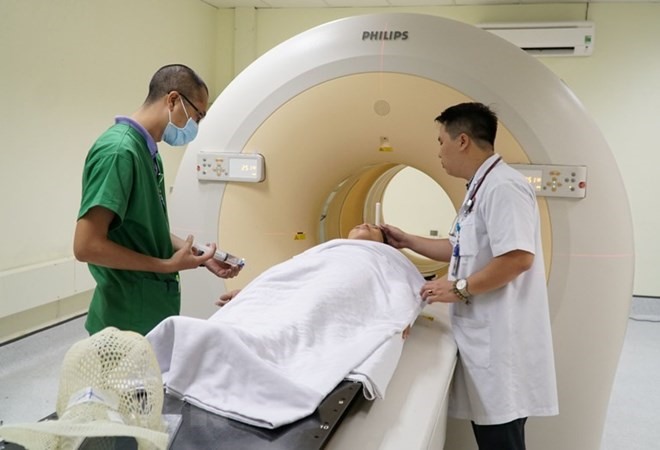 Society
Society

The HCM City's Department of Health plans to develop a high-tech centre for cancer screening next year to reduce the number of people who need to go abroad for health examinations.
 |
| A patient is being screened for cancer at a hospital in HCM City. – VNA/VNS Photo Phương Vy |
HCM CITY – The HCM City’s Department of Health plans to develop a high-tech centre for cancer screening next year to reduce the number of people who need to go abroad for health examinations.
“The centre will also help reduce overcrowding at many large hospitals, including at the Oncology Hospital. The doctors will have more time for treatment,” Dr Tăng Chí Thượng, the department’s deputy head, said during an annnual conference on cancer prevention which ends on Friday in HCM City.
Thượng instructed the Oncology Hospital and other specialised health facilities to take part in the development of the centre, and encouraged them to expand their networks for cancer prevention in the community.
The Oncology Hospital, for instance, has carried out many programmes on how to take care of patients’ health during and after treatment.
Patients are also informed about various cancer therapies and given psychological support via the hospital’s clubs.
The hospital, which has many screening programmes to detect and treat cancer in the early stages, has worked with media to develop TV counselling programmes and place stories in newspapers about cancer prevention
Its doctors have also visited many schools in the city to talk about health care.
Thượng told the hospital to continue its tasks assigned by the Ministry of Health, including sending its doctors who specialise in oncology to general hospitals in the Mekong Delta provinces of Kiên Giang, Cà Mau, and Cần Thơ; the provinces of Khánh Hòa, Bình Định, Lâm Đồng, and Đồng Nai; Đà Nẵng, and others.
The knowledge and skills of oncologists have also been improved via the annual cancer prevention conference organised by the hospital in co-operation with Việt Nam National Cancer Hospital, Việt Nam Cancer Society and HCM City Cancer Society.
The conference attracts many domestic and foreign experts who share their experiences and the latest information about cancer treatment and diagnosis.
This year, the conference featured 19 sessions on the head and neck, digestion, hematology, lung and rib-cage, breast, paediatrics-obstetrics and others.
Cancer rate
Dr Phạm Xuân Dũng, head of the Oncology Hospital, said that although progress had been seen with diagnosis and treatment, cancer remains a burden for the world, including Việt Nam.
“The rate of new incidences and mortalities caused by cancer continues to increase,” Dũng said.
The global cancer burden is estimated to have risen to 18.1 million new cases and 9.6 million deaths in 2018, according to the International Agency for Research on Cancer Cancer.
One in five men and one in six women worldwide develop cancer during their lifetime, and one in eight men and one in 11 women die from the disease.
Worldwide, the total number of people who are alive within five years of a cancer diagnosis, called the 5-year prevalence, is estimated to be 43.8 million.
The increasing cancer burden is due to several factors, including population growth and ageing as well as the changing prevalence of certain causes of cancer linked to social and economic development.
This is particularly true in rapidly growing economies, where a shift is observed from cancers related to poverty and infections to cancers associated with lifestyles more typical of industrialised countries.
Việt Nam is estimated to have an additional 164,000 new incidences of cancers, according to GLOBOCAN 2018. The figure was 125,000 in 2012. In addition, more than 114,000 people died from cancer, an increase of more than 94,000 in 2012.
Immunotherapy
New cancer treatments are being developed, including immunotherapy.
Professor Nguyễn Chấn Hùng, chairman of Việt Nam Cancer Society, said: “Immune-modulation by checkpoint inhibitors have demonstrated to be capable of inducing long-lasting tumour response.”
The development of new agents such as immune checkpoint inhibitors has achieved unprecedented efficacy in a wide variety of tumours, dramatically changing the landscape of cancer treatment in recent years, Hùng said.
“We are making large steps in cancer treatment compared to the previous decades,” Hùng said.
He said that Immunotherapy is recognised as “key element” in a strategy for cancer treatment, but oncologists should know that any therapy also causes side effects, and that many therapies should be used in treatment.
Dr R Pathmanathan of Subang Jaya Medical Centre in Malaysia said: “Not all patients respond to and benefit from immunotherapy. So we need biomarkers to guide decision making in immunotherapy.” – VNS




